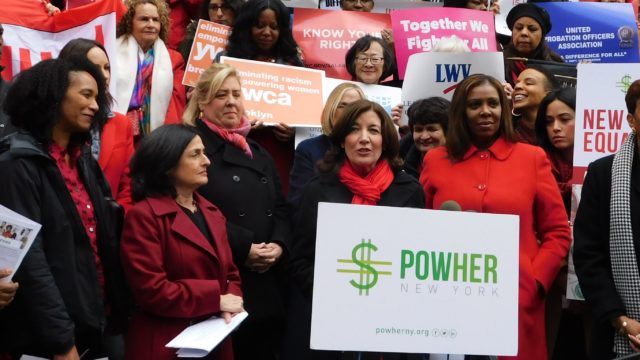The 12th Annual Equal Pay Day rally sponsored by the PowHerNY Network was big, loud, and bold! Speakers announced commitments to address the persistent wage gap and different aspects of the fight to eradicate the wage and opportunity wage in New York. Check out some video from our rally below!
In New York City
PowHerNY President Beverly Neufeld kicked off the rally, noting that the #TimesUp and #MeToo movements are pushing us forward, while a wave of federal rollbacks are reversing our hard-won progress. Challenging New Yorkers to take bold action in our state to finally change a culture that underpays, undervalues and overworks women, the speakers addressed solutions and next steps.
Lieutenant Governor Kathy Hochul announced that Governor Cuomo released a strong Salary History Ban bill for passage in 2018, as well as findings from the new NYS Gender Wage Gap Study which charts a course to end the wage gap in New York!
I heard horrible stories from all over the state about women’s paychecks being smaller than men’s for the same work – that era is over.
We are advancing legislation prohibiting employers – public and private – from asking salary history. #TimesUp #EqualPayDay pic.twitter.com/YlgNgfKViS
— Kathy Hochul (@LtGovHochulNY) April 10, 2018
NYC Public Advocate Letitia James rallied the crowd and pledged continued work to end the disparities revealed in her recently released study about the municipal workforce.
Representing the NYC Commission on Gender Equity, Executive Director Jacqueline Ebanks affirmed the Mayor and First Lady’s continued commitment to end wage inequity and publicized a new best-practices guide for business, “Leveling the Paying Field,” co-produced by the Commission and PowHerNY.
Catt Sadler, broadcaster and former co-anchor of E! News, shared her story of inequality and inspired the crowd with calls for women to know their worth. Her film crews recorded the rally for use in a future documentary!
Today is a day I’ll never forget. Activists. Union members. Restaurant workers. Moms. Politicians. Women of all races demanding change and invested in progress. Thank You for letting me share my story. This is an important and necessary fight. NY – you were on fire! #EqualPayDay pic.twitter.com/Dh6aI30Zft
— catt sadler (@IAmCattSadler) April 11, 2018
NYC Council member Carlina Rivera, representing the members of the Women’s Caucus as Co-chair with CM Margaret Chin, called for, in Spanish and English, further action to close the wage gap, especially for women of color in NYC.
Surrounded by hundreds of union members sporting red hats and jackets, waving signs, new President Gloria Middleton announced that CWA Local 1180 was about to finalize a settlement with NYC, ending the EEOC lawsuit over decades of discriminatory pay practices.
Thanks for joining us @CWA1180! #equalpayday #EqualPayDayNY pic.twitter.com/FEgkZLAjaE
— PowherNY (@PowherNY) April 10, 2018
PowHerNY President Beverly Neufeld gave special thanks to A Better Balance and AAUW for their exceptional partnership on the Equal Pay Campaign. Nationally, AAUW will train 10 million women to negotiate their financial futures by 2022.
NYC child care educator Christine Olivieri and restaurant worker Gemma Rossi shared their poignant stories of inequality in their industries and the fight for One Fair Wage and child care parity.
Representing the NYC Commission on Human Rights, Brittny Saunders shared the successful roll-out of the NYC Salary History Law, one year after it was signed into law.
Women’s Issues Committee Chair, Council member Helen Rosenthal, pointed to the intersection of sexual harassment and unequal pay, announcing that a suite of laws to combat sexual harassment in the public and private sectors would be passed in NYC shortly.
Around the State
The PowHerNY Network helped push forward legislation and resolutions this Equal Pay Day.
Westchester County: County Executive George Latimer signed a Salary History Ban.
Erie County: Introduction of a resolution in support for a statewide ban on the practice of employers using salary history to set wages for a potential hire, press conference, and discounts at a local coffee shop marked Equal Pay Day.
Auburn: Equal Pay Day Proclamation by Auburn City Council was presented to Seneca Falls Women March members
Syracuse: Syracuse University women faculty published a letter in The Daily Orange to bring attention to gender pay gaps revealed in a December 2017 report.
Jamestown: Pay Equity Day panel discussion sponsored by JCC, AAUW Jamestown, and Bellevue University.
National Important Legal Decision
In the Rizo v. Fresno lawsuit, on April 9, 2018, in a unanimous ruling by an 11-judge panel, the Ninth Circuit held that using prior salary alone, as a “factor other than sex,” or in combination with other factors cannot justify a wage differential, further reasoning that this would allow employers to profit on this inequity and perpetuate a gender wage gap in direct contrast with the intent of the Equal Pay Act of 1963.


